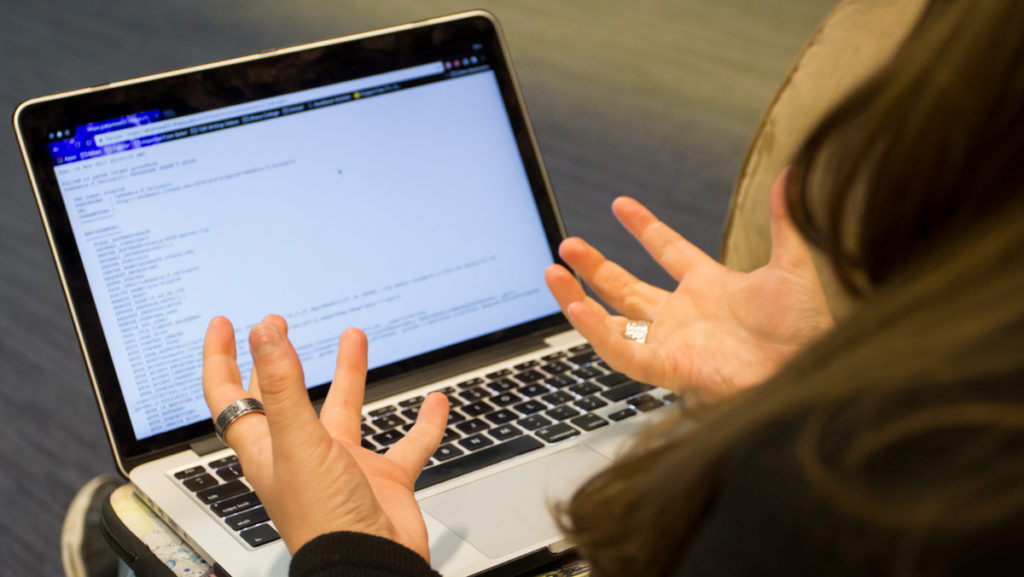Many Ithaca College students have complained about course registration, which started Nov. 7, when HomerConnect began crashing. The college tried a new registration system but did not adequately anticipate the influx of users operating on the site from more than one browser, David Weil, associate vice president of Information Technology, said.
HomerConnect is the college’s student information system that students use to register for class and to view class schedules, the course catalog and financial aid information. During the first week of the Spring 2018 course registration period, HomerConnect crashed while students were trying to register for classes. On Nov. 7, it crashed at 12:20 p.m., and it took 60 to 90 minutes to stabilize. On Nov. 9, the system was very slow between 12:15 p.m. and 12:30 p.m., but it did not crash, Weil said.
To register for classes, students enter their course registration numbers into the Add/Drop section of HomerConnect. Weil said HomerConnect was overloaded because too many people were trying to access the system at one time in order to get into their desired classes, and it could not respond to the incoming requests in a timely fashion. He said the overload caused the system to crash.

Weil said the HomerConnect system is operating on new hardware as of this semester. He said that prior to registration, it was successfully tested to hold a capacity of approximately 1100 users per time slot. Weil said he would not disclose how much the hardware and maintenance of the system costs. He said that last week was the first round of registering students to go through the upgraded system, and it was overloaded in a way Information Technology could not have anticipated or prepared for during testing.
Weil said that if the system was successfully tested to hold a capacity of 700 people at one time, in reality, those 700 people may also be trying to access the system on multiple browsers or on multiple devices. He said this behavior would appear to the system as though 2,100 people were trying to access the system, which would cause it to overload.
Vikki Levine, the college registrar, said there are a total of eight registration time tickets over a two–week period. The registration days were Nov. 7, 9, 14 and 16 with two times each of 7:30 a.m. and 12:15 p.m. — a change from multiple time slots over a given week. She said the number of students per time slot ranges from approximately 600 to 1,100 students.
Senior Matthew Lucas said that when he tried to register on Nov. 7 at 12:15 p.m., the website took a long time to load, and when he was entering his course registration numbers, the site crashed. He said it took him 20 minutes to finish registering, and due to the slow connection, he was not able to get into all the classes he needs to graduate because they had filled up before he could register. Lucas said he was able to resolve the issue by consulting with the Academic Advising Center.
Lucas said he felt surprised that the college’s system does not have the means to handle a larger capacity of users, considering the importance of registration for students.
“I think it’s insane that the college doesn’t allocate enough server space for what is one of the most important processes for students,” Lucas said. “You’d think there’d be some part of their massive budget to go towards being able to handle that amount of traffic instead of, you know, renovating the dining halls for the 15th time.”
Freshman Jordan Stecker said that when he tried to log onto HomerConnect on Nov. 7 at 7:30 a.m., he immediately got logged out and was unable to log back on for 10 minutes. He also said the degree evaluation tool, a feature of the site that allows students to see what requirements their courses meet, stopped working, and he said it took him four attempts to get it to work.
Stecker said he thinks HomerConnect is useful for figuring out which classes to take and understanding times that classes are available, but he said its technological difficulties made him feel like he could hardly use it.
“What was supposed to make things easier has become a nuisance,” Stecker said.
Senior Jonathan Burger said he felt that the decision to pool large amounts numbers of students into the same registration times slowed the registration process and made it more difficult.
“I wasted an hour of my day constantly refreshing HomerConnect in order to get into my required classes,” Burger said. “If we had a halfway decent Information Technology department, it wouldn’t have been a problem.”
Levine said that when students log in to the system with the same credentials twice, like one window on the Look Up Classes page and another on the Add/Drop page, it also causes the system to lock up on them.
“I think human nature and our behavior — whether it’s registration, or Amazon, or when we’re trying to get those concert tickets, we keep banging at it, and it causes it to lock up more,” Levine said.
Weil and Levine said Information Technology had been working over the weekend of Nov. 11–12 to fix the issue before the second week of registration began. Weil said Information Technology has added more memory to the system, made adjustments to the number of processes that will run at any one time to the number of connections, and added capacity with the new hardware. He also said Information Technology has reached out to the company Ellucian, which makes the college’s registration system, and he said they are following the company’s guidelines to make certain adjustments to the system to fix the overload problem. Weil said Information Technology has also reached out to other schools for information as to what those institutions do in similar situations.
Casey Kendall, executive director of applications and infrastructure, said that Information Technology has made adjustments and improvements based on what Ellucian has said, and it is going to monitor and put deeper analytics into the system to see if they need to make additional improvements.
Weil said the college has had problems with HomerConnect and registration in the past, and every time the system has a major upgrade, it needs to be readjusted. He said that at one point, the entire college was registering at the same time and the system could not handle it. The college then went into using time tickets, which is the system it currently uses. Time tickets performed well on HomerConnect, but allocating fewer students to each time ticket caused frustrations among the students.
Levine said one registration process the college has used in the past, including last year, involved seven time tickets a day and fewer people per ticket. This made students frustrated because those with the last time ticket of the day were upset that they were not in the first ticket. She said that to create fairness in registration, the registrar has been working with Information Technology to find a system that can give all students one time ticket.
“We’re always trying to get student feedback and find the best system based on consensus from the whole,” Levine said. “This wasn’t perfect, but I really think it’s moving in the right direction.”
Weil said the performance of HomerConnect last week was not acceptable and said they are working to fix it. He said the college is making major investments in the HomerConnect system over the next year and that the college will upgrade to the newest version of HomerConnect. The registration system the college uses through the Ellucian company is called Ellucian’s Banner, and Weil said he anticipates the college will be using the new Banner 9 by Spring 2019. He said Banner 9 will have a new interface and will be more compatible between different mobile devices.








